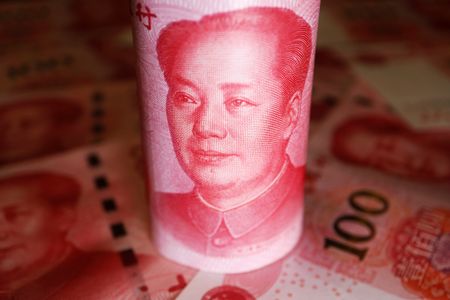By Archishma Iyer
(Reuters) – Bullish bets on the Thai baht and Chinese yuan hit five-year highs as China’s sharp pivot from its strict COVID-19 curbs boosted investors’ appetite for strengthening long positions in regional currencies, a Reuters poll showed on Thursday.
Long positions firmed on nearly all Asian emerging currencies, many of which had plunged to multi-year lows against the U.S. dollar in 2022 due to the U.S. Federal Reserve’s aggressive monetary tightening and other factors such as rising inflation and the Russia-Ukraine conflict.
Bullish bets on the South Korean won and Malaysian ringgit were at more-than-two-year highs, while bets on the Singapore dollar were the most bullish in five years, the fortnightly poll of 12 analysts showed.
“Lower positioning, cheaper valuations, a softer U.S. dollar, peak Fed rates and the onset of an easing cycle across emerging markets later this year will improve the attractiveness of EM FX and local currency debt, suggesting that investors will increasingly return to EM assets following a very tough 2022,” analysts at TD Securities said in a note.
The appetite for high-risk Asian assets has increased significantly since China, a manufacturing powerhouse and the region’s largest trading partner, began dismantling its stringent COVID curbs in December, while firming bets that major central banks would ease monetary policy also aided sentiment.
The biggest benefactor of China’s mobility relaxations has been the Thai baht, which scaled a more-than-nine-month peak on expectations the Southeast Asian country will benefit from more Chinese tourists, estimated to be at least five million this year.
The baht has strengthened 3.5% in the first two weeks of 2023, more than any of its Asian peers, with bullish positions hitting the highest since January 2018.
“The Thai economy is likely to be on the sweet spot of experiencing strong growth recovery and (and) appreciating Thai baht without slowing the pace of growth materially,” Enrico Tanuwidjaja, an economist at United Overseas Bank, said in a note.
“The Thai baht looks set to outperform other Asian currencies in 2023.”
Meanwhile, investors turned marginally bullish on the Indonesian rupiah for the first time since April last year, although the long bets on the currency were the least among the currencies that were a part of the Reuters poll.
The only currency, among the nine in the poll, was the Indian rupee. However, investors sharply cut their short positions on the currency to levels last seen on February 2022, although headwinds from a widening current account deficit continue to pose a challenge.
The Asian currency positioning poll is focused on what analysts and fund managers believe are the current market positions in nine Asian emerging market currencies: the Chinese yuan, South Korean won, Singapore dollar, Indonesian rupiah, Taiwan dollar, Indian rupee, Philippine peso, Malaysian ringgit and the Thai baht.
The poll uses estimates of net long or short positions on a scale of minus 3 to plus 3. A score of plus 3 indicates the market is significantly long U.S. dollars.
The figures include positions held through non-deliverable forwards (NDFs).
The survey findings are provided below (positions in U.S. dollar versus each currency):
DATE USD/CNY USD/KRW USD/SGD USD/IDR USD/TWD USD/INR USD/MYR USD/PHP USD/THB
12-Jan-23 -1.58 -1.39 -1.31 -0.1 -0.67 0.07 -0.82 -0.61 -1.85
15-Dec-22 0.08 -0.55 -0.85 0.92 -0.22 0.63 -0.36 -0.15 -0.69
1-Dec-22 0.63 -0.15 -0.3 1.08 0.15 0.76 -0.02 0.33 -0.16
17-Nov-22 0.74 0.21 -0.06 1.06 0.84 1.13 1.18 0.89 0.4
03-Nov-22 1.81 1.38 0.47 1.57 1.81 1.47 2.02 1.36 1.34
20-Oct-22 1.96 2.02 1.13 1.83 1.98 1.6 2.33 1.94 2
06-Oct-22 1.94 2.25 1.53 1.86 2.12 1.55 2.22 2.16 2.08
22-Sept-22 2.09 2.39 1.61 1.35 2.37 1.23 1.9 1.94 1.86
08-Sept-22 2.04 2.33 1.54 1.13 1.93 1.35 1.89 1.7 1.59
25-Aug-22 1.68 1.85 1.12 1.03 1.53 1.31 1.9 1.38 1.28
(Reporting by Archishma Iyer; Editing by Savio D’Souza)

